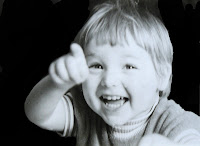Tomorrow, 22 June 2012, my dear late father Moisei (Misha) Levin would have turned 75 years old. I remember, when I was a small kid I was thinking about the year 2000 and how I would be 27 years old and my father 63, and how we would go together to the main street of Minsk for the New Year 2000 celebrations. This never came to be, as my father died unexpectedly of a heart attack on March 28, 1993. He was only 55 years old, and I was 19 at the time.
My dad was a quiet, kind, pensive person. I remember he would often sit and look into the distance, oblivious to what was going on around him, thinking his thoughts. I remember how I, as a small boy, was climbing all over him, listening to his heartbeat, exploring his beard. He was rather short, rather full-bodied, not the kind of father to brag about to your school friends. But he had beautiful big eyes and beautiful long black eye-lashes (that both me and my sister and my daughter inherited from him).
But above all he was a decent man. He never complained, never shouted at us kids, never said bad things about people in their absence, was polite and considerate in his dealings with people, yet firm in following his principles.
My dad was born on June 22, 1937 in Vitebsk to Aron Levin and Hannah (Dasha) Pukhovich. His grandparents Simkhe and Chaya Levin lived in the small Jewish shtettl of Lapichi, some 100 km south of Minsk. Simkhe had an entrepreneurial spirit. In 1904 he went to work in New York City as a laborer for 2 years together with his two younger brothers, but came back to his family in Lapichi. Together with his wife they set up a small shop. Simkhe travelled around to buy agricultural produce from local peasants, he also set up a small candle manufacturing business and sold candles to churches. Simkhe and Chaya had 6 children: Moishe, Aron (my grandfather), Dasha, Bertha, Samuil and Musya. After the Russian revolution Simkhe and his family were declared
lishenets, which meant that they couldn't vote, couldn't be employed by the government, couldn't receive higher and technical education and were subject to other restrictions.
My grandfather Aron Levin (born 1908) is said to have inherited his father's entrepreneurial skills. But his life was cut short at the age of 34 as he was killed in action in late June 1942 (almost exactly 70 years ago) at the Leningrad-Volkhov Front after drafting into the Soviet Army as a private. He didn't know that his father Simkhe (68) and his elder brother Moishe (39) were executed by the German Wehrmacht (regular armed forces) in August 1941 together with some 60 other adult Jewish men of Lapichi. In August 1942 the rest of the Jewish population of Lapichi (mostly women and children) were executed by the Nazis and local collaborators. Among them were my father's grandmother Chaya (64), Moishe's wife Fanya (28) and her 2 sons Genya (4) and Zyama (1), my father's aunt Dasha (31) and her 3 sons Gerik (5), Roma (3) and Zyama (10m), and some other relatives.
The Germans invaded Soviet Union on the day of my father's 4th birthday. They swept over large areas of Belorussia and Ukraine in a matter of days. My father and his younger sister Polina survived thanks to their aunt
Musya (then 20 years old), who rushed to Vitebsk from the burning Minsk and persuaded Aron and Hannah to evacuate immediately to the East. Misha and Polina were the only children in our family who were born before the war and survived the war and the holocaust, their 11-month-old brother Solomon died of typhus in November 1942.
My father's maternal grandfather David Pukhovich was arrested by the NKVD secret service shortly before the war. He presumably died in custody, date and cause of death remain unknown.
My father's family returned to Minsk in 1944. His mother was trained to be a Yiddish (Jewish language) teacher before the war, but she couldn't find a job after the war as the teaching of Yiddish was effectively banned. She had to settle for a job as a shop assistant. My father's surviving aunts Bertha and Musya and uncle
Samuil were supporting them in all possible ways.
He was a good student excelling in most subjects, but above all in math and physics. One of his former fellow students related to me that my father didn't have many friends at school because he was very serious and far ahead in his studies. Once he met my father just the day before an exam as my dad was going to the movies. When asked: how about the exam?, my father simply replied that he had already learned everything. According to this fellow student, my father was quite uncompromising at school and quite bold towards some teachers. He never participated in any official committees.
After school he applied to the prestigious MFTI (Moscow Institute of Physics and Technology). He had all the needed qualifications but was not admitted based on the application interview. He had to apply to the Technological Institute in Minsk, where he started his scientific work in Theoretical Mechanics. As a student he volunteered to the Virgin Land Campaign (Целина) in Kazachstan, where he contracted malaria and barely survived.
Apart from science he had a passion for music and played the violin in an amateur symphony orchestra. He married my mother Lora Barshay in 1964 and my sister Lena was born in 1965. By the time he was already a Candidate of Technical Sciences (degree equivalent to PhD) and was working on his Doctoral thesis, which he completed in 1973, the year that I was born. However he was not allowed to defend the thesis as the communist party committee of the Polytechnical Institute refused to give him a positive characteristic.
In the late 1970's he had a chance to emigrate to the United States, but he decided not to, probably out of fear of becoming a refusenick, fear of not being able to find a job and reluctance on the part of the rest of the family.
All this time he taught Theoretical Mechanics at the Belarusian Polytechnical Institute in Minsk, often teaching some 20 hours a week. Although some students would laugh as he would introduce himself and his foreign-sounding Jewish name: Moisei Aronovich, I heard from many of his former students (some of whom were youth leaders at the summer camps that I went to) that they really liked him, because he was respectful and fair to them. My father once told me that the purpose of an oral exam (which was a common practice at the time) is not to show the student what he doesn't know, but to discover what he knows about the subject.
But his real passion was research, which he conducted mostly in his spare time behind his desk in our small 1-bedroom apartment. He wrote some 70 scientific articles, was awarded several patents, and wrote a book summarizing his research. He was one of the first scientists in Minsk to use computers (ALGOL and FORTRAN programming languages) for his research and calculations.
He eventually managed to defend his thesis in Leningrad in the late 1980's and to publish his monograph
The theory of deformable wheel rolling with the prestigious Moscow "Science" publishing house. Yet all the troubles he had to go into undermined his health. He died abruptly in March 1993 at the age of 55. His Professorship Certificate came in by post after his death.
I owe a lot to my father. My interest in science, computers and foreign languages, which played probably the most significant part in my success in life, were due to a large extent to him, as I often went with him to his computer center, learned from him to program our micro-calculator, and we would often listen together to the BBC World Service in English on our short-wave receiver. He was also instrumental in helping me develop my musical abilities.
But to be frank, as a teenager I didn't pay much attention to my father. I was busy with my own life, my own growing up, my own interests, which is probably typical of that age. At times I was disrespectful. I was taking him for granted.
His death was a severe shock and left me with a profound sense of loss and guilt. I missed him badly. I missed his warm hands, his embrace, his presence. Those were difficult times with the Soviet Union having collapsed and new economic realities taking place. I lacked self-confidence. Who could I go to for advice, love, understanding? How was I to navigate the rough seas of life?
I lamented the fact that I was given so many opportunities while he with his talent for science was denied so many. It's so unfair that he couldn't realize many of his ideas and inventions, that he didn't live long enough to enjoy deserved retirement and rest, to watch his grandchildren grow.
Yet I believe that his legacy will live in his children and grandchildren and great-grandchildren. And I see it as my duty to pass on his memory and the memory of our forefathers to the future generations of our family.
P.S. For more information about the Levin family of Lapichi, please take a look at my website
http://www.levins.info/




